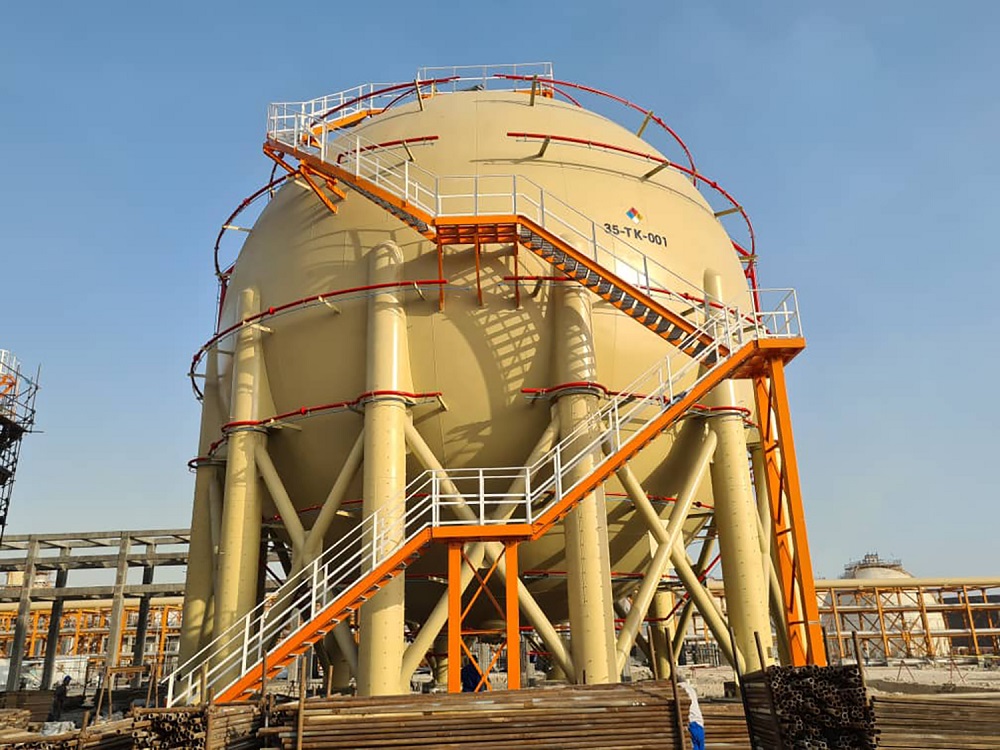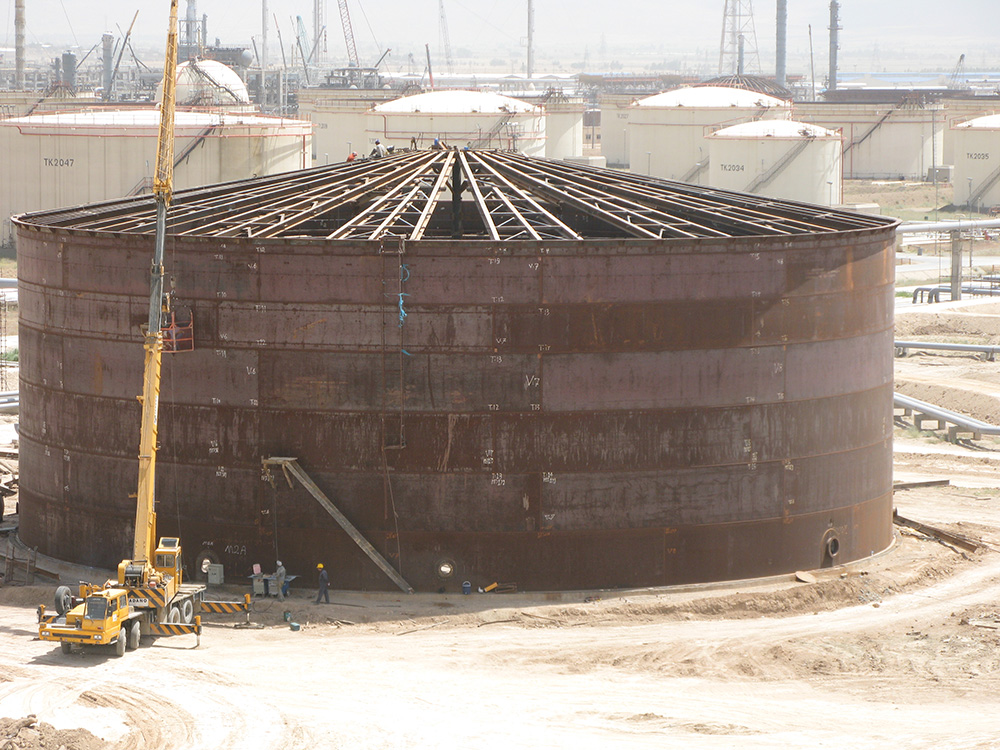Pressure vessels are crucial components in refinery industries used for storing and containing gases and liquids under high pressure. These vessels are designed and manufactured in various types, each with specific features and applications.
This article examines spherical pressure vessels used in refineries. Due to their unique design and mechanical advantages, these vessels are widely used in the oil and gas industries.
Design and Structure of Spherical Pressure Vessels
The design and structure of a spherical tank under pressure are simple yet efficient. The spherical shape helps distribute internal pressure evenly, reducing mechanical stresses on the vessel walls. This feature makes spherical vessels ideal for storing high-pressure gases.
Types of Spherical Pressure Vessels
Spherical pressure vessels are classified based on their applications, materials, and operating conditions. The types of spherical pressure vessels are as follows:
1. Spherical Vessels for Storing Liquid Gases
Applications:
- Petrochemical industry: Storing liquid gases like propane and butane
- Oil and gas industry: Storing LPG (Liquefied Petroleum Gas)
Features:
- High pressure resistance: The spherical shape distributes internal pressure evenly
- Safety: Reduced risk of leaks and explosions due to even stress distribution
2. Spherical Vessels for Storing Pressurized Gases
Applications:
- Medical industry: Storing medical gases like oxygen and nitrogen
- Welding and cutting industries: Storing pressurized gases like acetylene and hydrogen
Feature:
- Long lifespan: The materials used are highly resistant to corrosion
3. Spherical Vessels for Storing Chemical Liquids
Applications:
- Chemical industry: Storing acids and hazardous chemicals
- Water and wastewater treatment: Storing chemicals needed for treatment processes
Features:
- High chemical resistance: Made from materials resistant to corrosion and chemical reactions
- Robust design: Capable of withstanding high pressures and harsh environmental conditions
4. Spherical Vessels for Fuel Storage
Applications:
- Power plants: Storing liquid and gaseous fuels
- Transportation industries: Storing fossil fuels and natural gases
Features:
- High safety: Designed to resist explosions and leaks
- High capacity: Capable of storing large volumes of fuel in a compact space
Types of Spherical Pressure Vessels Based on Material
The material used in manufacturing spherical pressure vessels plays a significant role in their performance and application. Choosing the right material based on operational needs and environmental conditions ensures the safety and efficiency of the vessel.
1. Steel Spherical Vessels
Applications:
- Oil and gas industry: Storing LPG and oil
- Power plants: Storing fossil fuels
Features:
- High mechanical resistance: Capable of withstanding very high pressures
- Long durability: Resistant to impact and abrasion
Disadvantages:
- Corrosion: Requires protective coatings to prevent rusting
- Heavy weight: Difficult to transport and install
2. Stainless Steel (Stainless Steel) Spherical Vessels
Applications:
- Food and pharmaceutical industries: Storing sanitary and sensitive materials
- Chemical industries: Storing acids and hazardous chemicals
Features:
- High corrosion resistance: Due to the presence of chromium in the alloy
- Cleanliness and hygiene: Smooth, shiny surface that is easy to clean
Applications of Spherical Pressure Vessels in Refineries
LPG Storage: One of the primary applications of spherical pressure vessels in refineries is for the storage of LPG (Liquefied Petroleum Gas). LPG is stored at very low temperatures and high pressure, and spherical vessels, due to their high strength, are ideal for this purpose.
Industrial Gas Storage: Spherical vessels are used for storing industrial gases such as oxygen, nitrogen, and argon. These gases are stored under high pressure, and the spherical shape helps in evenly distributing the pressure.
Hydrogen and Ammonia Storage: Hydrogen and ammonia require high-pressure storage and need strong vessels. Spherical vessels are suitable for these gases due to their robust structure.
Chemical Storage: Some chemicals that need to be stored under high pressure are kept in spherical vessels. These vessels are suitable due to their high resistance to pressure and corrosion.

Advantages of Spherical Pressure Vessels
High Strength: The spherical shape helps in the even distribution of stresses, increasing the vessel’s strength against internal pressure.
Material Efficiency: Due to the even distribution of pressure, the vessel walls can be made thinner, reducing construction costs.
Lower Maintenance Costs: Spherical vessels have fewer weak points due to their geometric shape, resulting in fewer breakdowns and reduced maintenance costs.
Disadvantages of Spherical Pressure Vessels
Despite their numerous advantages, spherical pressure vessels have some drawbacks. The initial costs of construction and installation can be high due to the need for specialized equipment and technology. Additionally, the large space required for installing spherical vessels can be another limitation.
Spherical pressure vessels are widely used in refineries due to their mechanical and economic benefits. With their even stress distribution and high strength, they are ideal for storing high-pressure gases and liquids. However, the high initial costs and space requirements pose challenges for their use.
Strength and Use of Spherical Vessels in Refineries
Geometric Design: The spherical shape helps in the even distribution of internal pressure and stress. This even distribution minimizes weak points in the vessel walls, making the vessel resistant to high pressures.
Construction Materials: Spherical vessels are made from high-strength materials such as stainless steel and corrosion-resistant alloys. These materials increase the vessel’s lifespan due to their high resistance to pressure and corrosion.
Welding and Fabrication: The welding process in the construction of spherical vessels is crucial. Precise and high-quality welding ensures the vessel is constructed without weak points and is leak-proof.
Inspection and Maintenance: Spherical vessels require periodic inspections and regular maintenance to ensure their safety and integrity. These inspections include non-destructive tests, corrosion assessments, and pressure tests.

Safety Measures for Spherical Vessels
To ensure the safety of spherical vessels used for storing high-pressure gases and liquids, the following methods and measures can be implemented:
Periodic Inspections
- Non-Destructive Testing (NDT): Methods such as ultrasonic, radiography, and magnetic particle testing are used to detect internal cracks and defects in the vessel structure.
- Visual Inspection: Inspectors can visually check the external condition of the vessel to identify any leaks, corrosion, or visible damage.
- Pressure Testing: This test ensures the vessel’s resistance to operational pressures and identifies any weak points before they cause accidents.
Regular Maintenance
- Regular Cleaning: Periodic cleaning of the interior and exterior surfaces of the vessels helps prevent the buildup of sediments and corrosive materials.
- Corrosion-Resistant Coatings: Applying corrosion-resistant coatings prevents the damaging effects of environmental conditions and the chemicals stored in the vessel.
- Replacement of Damaged Parts: Any damaged or worn-out parts should be promptly replaced to prevent accidents.
Monitoring and Alarm Systems
- Pressure and Temperature Sensors: Installing precise sensors for monitoring internal pressure and temperature can prevent abnormal conditions.
- Alarm Systems: Alarm systems notify operators when the vessel approaches dangerous conditions, allowing for quick corrective actions.
Staff Training
- Safety Training: Staff should receive necessary training in safety and the handling of pressure vessels.
- Practical Drills: Conducting practical drills for emergency situations prepares staff to handle potential accidents.
Design and Construction to Valid Standards
- Compliance with International Standards: The design and construction of vessels should adhere to reputable international standards such as ASME (American Society of Mechanical Engineers) and API (American Petroleum Institute).
- Use of High-Quality Materials: Selecting high-quality, pressure- and corrosion-resistant materials is crucial for vessel construction.







